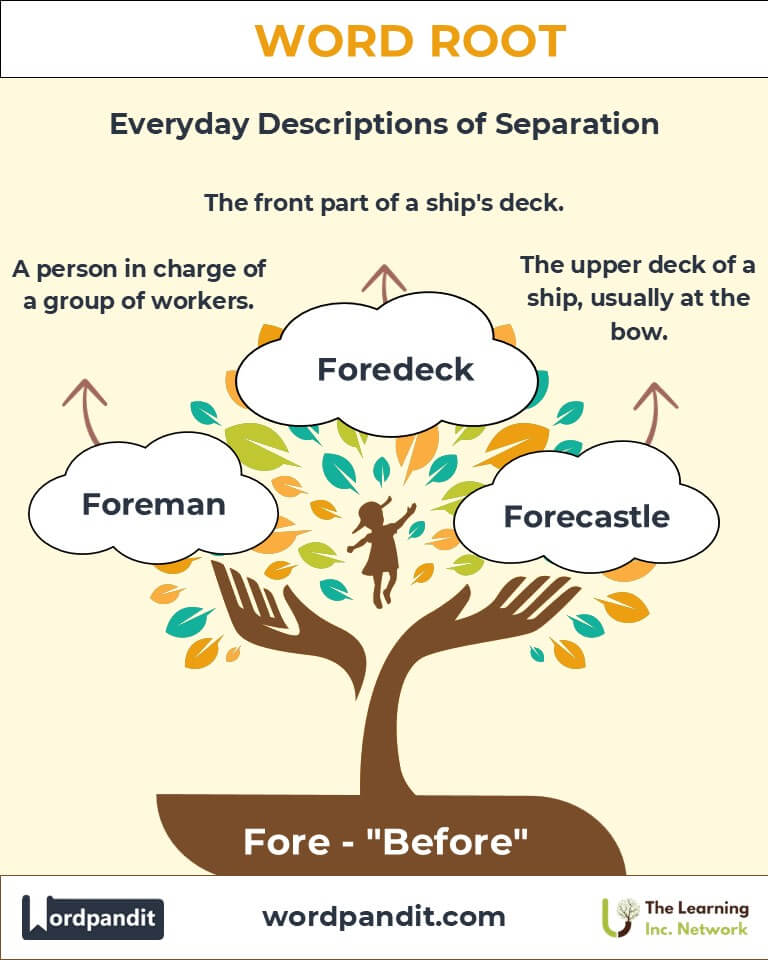Fore: The Root of Anticipation and Placement in Language and Life
Discover the fascinating world of the root "Fore," a linguistic building block that signifies "before" or "in front." From everyday words like "foresee" and "forewarn" to technical terms like "foreground," this root highlights our ability to predict, prepare, and prioritize.

Table of Contents
- Introduction: The Significance of "Fore"
- Etymology and Historical Journey
- Mnemonic: Unlocking the Power of "Fore"
- Common "Fore"-Related Terms
- "Fore" Through Time
- "Fore" in Specialized Fields
- Illustrative Story: "Fore" in Action
- Cultural Significance of "Fore"
- The "Fore" Family Tree
- FAQs about the "Fore" Word Root
- Test Your Knowledge: "Fore" Mastery Quiz
- Conclusion: The Living Legacy of "Fore"
1. Introduction: The Significance of "Fore"
Have you ever tried to foresee an event, planned ahead to forestall a problem, or admired the foreground of a painting? These words share a common thread: the root "Fore," which originates from Old English, meaning "before" or "in front." Pronounced as "for," this root is integral to expressing anticipation, preparation, and precedence in language, life, and thought.

2. Etymology and Historical Journey
The root "Fore" stems from Old English for- or fore, meaning "before" or "at the front." Its usage can be traced back to Germanic languages, where it described concepts of time, space, and importance. Over centuries, "Fore" has been integrated into English vocabulary to convey ideas of priority and preparation, reinforcing its timeless relevance.
3. Mnemonic: Unlocking the Power of "Fore"
Picture a lighthouse on a cliff, shining its light foreward to guide incoming ships. This image encapsulates the root’s essence: illuminating what lies ahead.
Mnemonic Device: "Fore shines a light on what's ahead, helping us prepare and prioritize."
4. Common "Fore"-Related Terms
- Foresee (for-see): To predict or anticipate.
Example: "The economist could foresee the market crash." - Forewarn (for-warn): To alert or caution beforehand.
Example: "She forewarned her team about the upcoming challenges." - Forefront (for-fruhnt): The leading or most important position.
Example: "The scientist was at the forefront of the discovery." - Forestall (for-stawl): To prevent or obstruct by taking action ahead of time.
Example: "The quick response forestalled a major crisis." - Foreground (for-grownd): The part of a scene nearest to the viewer; the most prominent or important feature.
Example: "The artist skillfully painted the flowers in the foreground."
5. "Fore" Through Time
- Forefather (Historical): Referring to ancestors or pioneers.
Example: "The forefathers of the nation laid its foundation." - Forebode (Archaic to Modern): To predict or signal something bad.
Evolution: Initially used in ominous contexts, it now broadly conveys predictions, often negative. - Foreknowledge (Medieval to Present): Awareness of an event before it happens.
Example: "His foreknowledge of the treaty gave him an advantage."
6. "Fore" in Specialized Fields
- Art and Design:
Foreground: Highlights key elements in visual compositions.
Example: "In photography, focusing on the foreground adds depth to the image." - Military:
Foreguard: The leading unit of an advancing force.
Relevance: Vital for strategy and defense. - Business:
Forecast: Predicting future trends or outcomes.
Application: Widely used in financial planning and market analysis. - Medicine:
Forearm: The part of the arm extending from the elbow to the wrist.
Significance: Central to anatomical studies and treatments.
7. Illustrative Story: "Fore" in Action
Amidst a fierce storm, Captain Elise relied on her crew’s ability to foresee hazards using radar. She forewarned them of approaching waves, positioning the ship’s strongest side against the impact. With her strategy at the forefront, they successfully forestalled a disaster, navigating to safety. Her foresight was hailed as a model for future sailors.
8. Cultural Significance of "Fore"
The root "Fore" plays a symbolic role in human culture, embodying our instinct to look ahead. From the wisdom of forethought in ancient proverbs to the modern necessity of forecasting, "Fore" bridges our past and future. Its presence in literature, art, and planning reflects a universal desire to anticipate and prepare.

9. The "Fore" Family Tree
Related Roots:
- Ante- (Latin: "before"):
Antedate: To precede in time.
Example: "This artifact antedates the Roman Empire." - Pre- (Latin: "before"):
Precede: To come before.
Example: "The introduction precedes the main text." - Pro- (Latin/Greek: "forward"):
Proactive: Taking initiative by acting in advance.
Example: "A proactive approach can prevent problems."

10. FAQs About the Fore Word Root
Q: What does "Fore" mean?
A: The root "Fore" means "before" or "in front." It is used to describe something that occurs earlier in time, is positioned at the front, or is anticipatory. For example, "foresee" means to see something ahead of time, and "forefront" refers to the leading position.
Q: Is "Fore" always used as a prefix?
A: While "Fore" is commonly used as a prefix (e.g., "foresee," "forewarn"), it also appears in standalone words or as part of compound terms like "forearm" (the part of the arm between the elbow and wrist) or "foregone" (something already decided or determined beforehand).
Q: What is the difference between "Foresee" and "Forecast"?
A: Both words involve anticipation, but their contexts differ. "Foresee" typically involves personal intuition or judgment, such as foreseeing someone's reaction. "Forecast," on the other hand, is systematic and often data-driven, such as weather forecasts or market predictions.
Q: Why is "Fore" used in golf?
A: The exclamation "Fore!" is a warning to others that a golf ball is heading their way. This usage aligns with the root’s meaning of warning or alerting about something coming ahead, emphasizing safety and awareness.
Q: What does "Foreknowledge" imply?
A: "Foreknowledge" refers to awareness of events before they happen, often gained through intuition, insight, or privileged information. It suggests preparation or strategic advantage, such as foreknowledge of a competitor’s plans.
Q: How does "Fore" connect with time and space?
A: "Fore" can refer to both time and physical positioning. In time, it signifies events happening earlier (e.g., foregone conclusion). In space, it highlights something at the front or leading position (e.g., foreground, forefront).
Q: What does "Forefather" mean, and how is it used?
A: A "forefather" is an ancestor or someone who founded or pioneered a particular group, movement, or nation. The term is often used in historical or patriotic contexts, such as referring to the forefathers of a country.
Q: What is the meaning of "Foreground" in art?
A: In art and photography, the "foreground" is the part of an image that is closest to the viewer, often emphasizing key subjects or details. It contrasts with the "background," which is further away and less prominent.
11. Test Your Knowledge: Fore Word Root Quiz
1. What does the root "Fore" signify?
2. Which word means "to prevent by acting early"?
3. What is the "Foreground" in art?
4. Which term describes ancestors or pioneers?
5. What does "Forewarn" mean?
12. Conclusion: The Living Legacy of "Fore"
The root "Fore" underscores our innate drive to anticipate and prepare for what lies ahead. From the forethought of our ancestors to the forecasts shaping our future, it encapsulates human ingenuity and resilience. By exploring "Fore," we not only enrich our language but also embrace the foresight essential to progress. Let "Fore" inspire you to stay ahead and illuminate your path forward.














